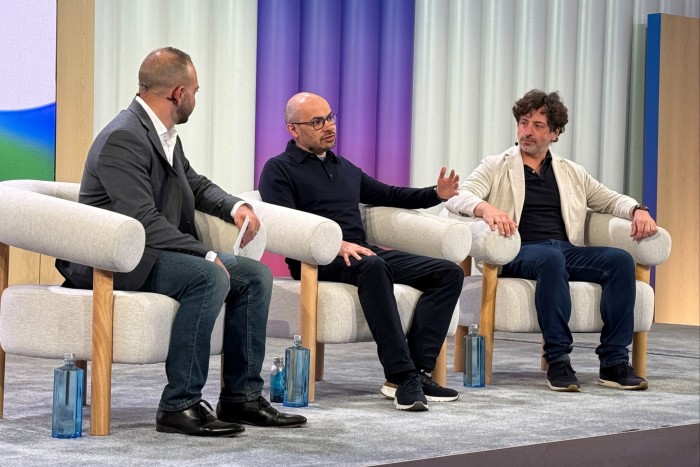Can Google still dominate search in the age of AI chatbots?

At Google’s flagship conference for developers this week, co-founder Sergey Brin made a surprise appearance to emphasise just how important artificial intelligence will be to the company’s future.
Brin revealed that he was working in Google’s AI lab every day, pushing its engineers to be the first to achieve artificial general intelligence, a system that surpasses the ability of humans.
“Honestly, anybody who’s a computer scientist should not be retired, they should be working,” he said. “AI will be vastly more transformative” than the internet or the mobile phone.
The more immediate question for the company is the challenge from AI to Google’s domination of the online search business, which has been under threat for the first time in a generation since the release of ChatGPT in late 2022.
After two years of false starts when it is widely seen to have squandered some of its advantage, Google this week made its most decisive move yet to try and regain the initiative.
Chief executive Sundar Pichai used the conference to launch what he called a “total reimagining of search” to address the challenge from AI chatbots. What the company is calling “AI mode” will be embedded in its search bar, browser and apps, allowing users to receive conversational answers to questions instead of a list of blue links.
The project is the centrepiece of Google’s vision for the future of search — one heavily influenced by the runaway success of OpenAI, the creator of ChatGPT — that seeks to leverage its Gemini large language models, data centres, user base and network of apps.
Yet as it embarks on such a major overhaul, Google and its parent Alphabet must confront what is sometimes called the innovators’ dilemma: how to integrate this new way of finding information online without jeopardising its $198bn in advertising revenues from search.
“Monetisation of AI in search is all that matters,” says Ben Reitzes, an analyst at Melius Research. “Search remains the vast majority of Alphabet’s profit . . . they better move fast before OpenAI figures it out first.”
Google has signalled that part of the answer is a departure from its free, ad-funded model. It has introduced paid subscriptions for its most advanced AI products including an AI agent called Mariner and video creation tools known as Veo, which are costly to develop and require unprecedented computing power to run.
These rise from $20 for a basic package to $250 a month for “ultra” access, more than premium tiers from rivals OpenAI and Anthropic.
It also has a plan to insert ads into AI mode — which it argues can be hyper-targeted and thus more lucrative to vendors — and sell new products like augmented reality glasses and ultimately robots.
But investors remain wary as Google confronts an array of existential threats. Its shares have underperformed its Big Tech rivals such as Microsoft and Meta and trade at lower multiples of earnings.
They are watching closely for signs of decreasing engagement on traditional search and whether new products boost revenue or merely cannibalise its existing business.
After losing a trio of antitrust cases, the company may also be forced to sell key assets such as its Chrome browser and ad-exchange marketplace, while sharing consumer data with its AI rivals to level the playing field.
The huge annual revenues from search have underwritten an empire that now spans from Waymo’s self-driving cars to the AlphaFold chemistry AI software that won a Nobel Prize last year for Sir Demis Hassabis, the head of DeepMind, one of its AI research arms.
Jim Tierney, a shareholder in Alphabet and head of the US growth fund at AllianceBernstein, says that the conference this week showed that the company “has a very competitive offering and will battle for every point”. But he adds: “The question that isn’t resolved is what Google’s market share is going to be in this new world.”
Powered by an upgraded version of its Gemini model, AI mode was launched for US users on Tuesday as a polished experience that speedily provides accurate answers.
Ben Gomes, the former head of search who is now in charge of learning, says that over time, Google search has allowed users to ask ever more complex questions. “AI mode takes it to a whole new level, because you can ask questions in natural language,” he says. “Your ability . . . has just grown manifold.”
It did not suffer from the embarrassing hallucinations that haunted the launch of its predecessor, “AI Overviews”, which shows brief answers to common topics at the top of results pages. That first attempt to infuse generative AI into its core product was widely ridiculed last year when it advised users to eat rocks, put glue on pizza and labelled President Barack Obama a Muslim.
The company’s dominant position gives it crucial advantages over new entrants: trust, unrivalled distribution and years of user data from billions of daily queries.
Despite the inroads from ChatGPT — which claims more than 600mn monthly users for its app versus 400mn for Gemini — Google still handles 90 per cent of all web searches and its Android operating system runs almost three-quarters of mobile phones globally. Its Chrome browser, Gmail, calendar and maps are ubiquitous and users can now opt to allow Gemini to use their online history to personalise their answers.

Google is “finally moving to offence on search . . . taking on a growing and well-funded competitor in OpenAI by integrating a directly competitive product”, says Justin Post, an analyst at Bank of America.
AI mode looks particularly threatening to Perplexity, a buzzy AI search start-up co-founded by a former Google intern that has grown to 30mn users in just two years.
While minuscule in comparison, it has rattled Google with its trajectory and is in talks with Apple to become a search option for its Safari browser, challenging Google for one of its most valuable partnerships.
Speaking to the FT, the upstart company’s chief executive Aravind Srinivas calls AI mode a “carbon copy of Perplexity”. However, he concedes that Google’s reach through search and its established family of apps would be difficult to disrupt.
“Google is one of the world’s greatest businesses and a massive monopoly, [but] it is also very vulnerable because the business is decided around one front end: search,” he adds.
Alongside the splashy new apps and devices, Google devoted much of the conference this week to explaining how it will protect and grow its $50bn in quarterly search ad revenue.
James Manyika, Google’s senior vice-president of research, labs, technology and society, says that it “makes sense” to start charging subscription fees for access to its most capable models “because they are computationally expensive”.
However, the $250-a-month ultra tier will be out of reach for many and its new products will have to rely on advertising to become profitable.
Pichai argues that rather than eating into existing revenues, AI encourages users to spend more time searching for answers and advice online and thereby enlarges the overall advertising market.
“AI mode is giving you context, expanding your interest, your curiosity, you will later research more,” he says. “When you go to those places, you have a much better intent. Those are much higher quality referrals” for advertisers.
Ads within AI Overviews will be rolled out for English language users in a number of regions this year, and product placement in ads is being tested in AI mode. When a user asks a non-factual question seeking advice, the chatbot will show a “helpful ad” for a related product with a “sponsored” label.
Google has amassed a vast database of personal information on billions of users through email, browsers and smartphones. Large language models — the technology that underpins chatbots — are excellent at inferring preferences and constructing profiles from chat history, making them powerful tools for advertisers.
“If ads are in context, they’re going to be much more targeted and helpful to the user,” says Manyika.
One example is a new “try it on” feature for clothes shopping, which allows users to upload photos of themselves, which are scanned by AI and then combined with a digital model of the garment to provide an approximation of the fit without visiting a store.
“Advertisers love that. Users engage more deeply with the experience,” Manyika says. “The strength of our ad business is benefiting from these innovations.”

But a lot hinges on whether the new AI tools work as intended. LLMs are still prone to hallucinations and soon after launch, users discovered Google’s new AI shopping tool had a flaw that added breasts on pictures of men, including vice-president JD Vance.
As well as its revamped search bar, Google unveiled a blitz of other innovations that point to the longer-term evolution of the product.
Subscribers have access to an integrated AI agent — Project Mariner — that can take control of web browsers in the background to complete mundane tasks like booking trips and tickets, or compile complex research reports from hundreds of sources.
Over time, Google says Mariner’s memory will allow it to learn preferences, anticipate needs and make more relevant suggestions.
More ambitious is Project Astra, an experimental “multimodal” agent that can respond and act on real-time voice queries and command as it views the physical world through a mobile phone camera or smart glasses.
Demonstrations showed it providing advice on mechanical issues, ordering products over the phone and translating conversations.

Investors reacted positively to the announcements this week with the stock rising around 3 per cent, trimming its losses this year to 10 per cent. By comparison, Microsoft has risen about 8 per cent and Meta 5 per cent, having shown clear pathways to making money from AI.
After a bruising few years, the conference was a chance for Google to flex its technological muscles and remind rivals of its deep pockets.
Privately, many at Google have bristled at criticism of its AI credentials, in particular given that it incubated the underlying technology and released it publicly in the 2017 transformers paper.
“We’ve done more than any other company in the world to advance the field. Large language models and the whole modern AI era wouldn’t exist without us,” says an executive at DeepMind, who asked to remain anonymous. “People should be very thankful — and they are not — for all we have done.”
“Sometimes we don’t talk enough about our successes,” he adds. “I feel like we should. And I think [this week] was a reminder of that.”
This article has been corrected to show that the cost of a basic subscription is $20 and not $25 as originally stated.








